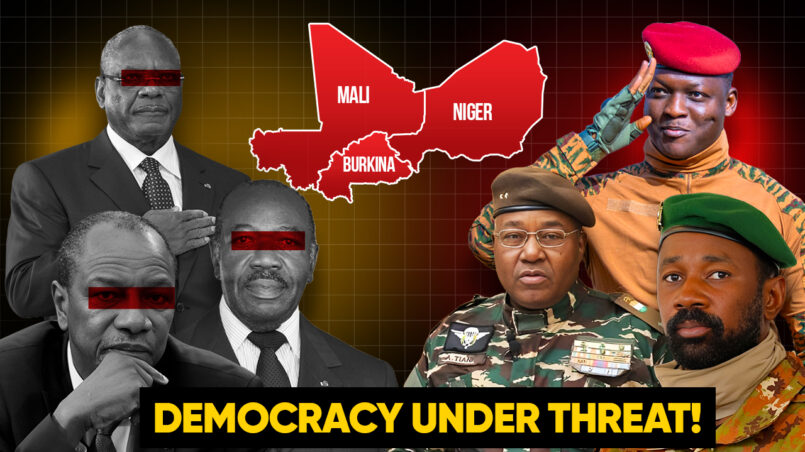Introduction
In January 2025, Capt. Ibrahim Traore of Burkina Faso attended the inauguration of Ghana’s newly elected president, John Dramani Mahama. For a leader who took power through a military coup, one might expect a cold reception but instead, he was greeted with massive cheer. In the days that followed, people across Ghana and much of Africa started questioning what seemed like a contradiction: why was a coup leader being cheered at a democratic swearing-in ceremony? Why was he even invited, and why was he allowed to carry a firearm at such an event?
To answer these questions, we need to understand the growing pushback against Western-style systems in the Sahel region and across the continent.
Background
Out of 486 attempted or successful military takeovers globally since 1950, Africa accounted for 214, with at least 106 being successful. Between the years 2020 and 2023, there have been at least seven successful regime changes through military force. Since 2020, the Sahel region has seen more governments toppled than at any other time in recent history.
In today’s video, our focus will be on the recent insurrections in the Sahel region, particularly in Mali, Guinea, Burkina Faso, and Niger which are seen not just as power grabs, but as responses to deep public discontent and a desperate demand for a system that wasn’t working. We will attempt to uncover 3 key elements that are fueling this trend.
- Political Instability & Weak Institutions
- Security Crises and Terrorism
- Foreign Influence and Sovereignty
Political Instability & Weak Democratic Institutions
Persistent political instability, characterized by corruption, poor governance, and unmet public needs has been central to the resurgence of military takeovers in the Sahel region. Even though these nations may be rich in natural resources, wealth hardly reaches the average citizen. Leaders such as Guinea’s Alpha Condé and Gabon’s Ali Bongo were accused of enriching themselves while their people struggled. The rising cost of living, inflation, and high unemployment have only deepened frustration.
In Mali, the military junta known as the Comité national Pour le salut du peuple (CNSP) accused President Ibrahim Boubacar Keita’s (IBK) administration of chronic corruption, embezzlement of public funds and nepotism.
In 2014, it was reported that the Malian government secretly purchased a $40 million presidential jet for IBK. The deal bypassed normal procurement procedures and was kept hidden from Parliament. The situation even prompted the International Monetary Fund (IMF) to suspend funds for Mali for six months. It was also reported that IBK ‘s administration signed shady contracts worth over $130 million for military equipment that was overpriced and often never delivered.
Public dissatisfaction with Keita continued to grow, despite the bold promises he made to the nation. When he was elected president in 2013, he vowed, and I quote: “I will bring an end to impunity. I will fight corruption tirelessly. No one will be able to illicitly enrich themselves at the expense of the Malian people.”
We have also seen leaders rig elections, reject electoral defeat, and manipulate constitutions to cling to power. Take Guinea for example, Alpha Condé changed the constitution to allow himself a third term in office, an action that sparked public outrage and ultimately triggered a military takeover.
As President Samia Suluhu Hassan of Tanzania once put it, “Unless and until African governments address the deficiencies in democratic governance and deliver essential public services to their people, democracy will remain an aspiration never to be meaningfully realised.”
Security Crises and Terrorism
The Sahel region has become a hotspot for jihadist insurgencies, leading to widespread instability and humanitarian crises. Groups linked to al-Qaeda, ISIS, and Boko Haram have been causing chaos in many parts of West Africa. As of 2024, reports from the UNHCR indicated that nearly 5 million people have been forcibly displaced across Burkina Faso, Mali, Niger, Mauritania, and neighboring coastal countries, marking a 25% increase since 2020. In the first half of 2024 alone, approximately 130,000 Malians sought refuge in Mauritania. Over 150,000 people fleeing Burkina Faso sought asylum in coastal countries since 2021.
In nearly all the recent government overthrows, military leaders have blamed the government’s failure to stop terrorist groups. In Burkina Faso, Capt. Traoré accused Paul-Henri Damiba who led the rebellion that overthrew President Kaboré of failing to address escalating terrorist attacks. He specifically pointed to the inability of the previous leadership to effectively combat jihadist insurgencies linked to groups like al-Qaeda and ISIS.
In Niger, General Abdourahamane Tiani, head of the Presidential Guard who led the takeover, cited the government’s failure to curb escalating jihadist violence as a primary reason for the regime change. Despite international support from France and the U.S., Niger continued to face attacks from groups affiliated with ISIS and al-Qaeda.
In Mali, the government faced accusations of failing to safeguard civilians and soldiers from terrorist attacks. According to a statement by the junta spokesperson, “the country was sinking into chaos, anarchy, and insecurity mostly due to the fault of the people who are in charge of its destiny.“
These were part of the rationale used to legitimize the military takeover, emphasizing the need for a stronger response to their country’s security challenges. Across the Sahel, the narrative is the same – governments failing to protect their people, and the military stepping in to fill the void.
The final point we will examine in this video relates to a longstanding issue that stretches back centuries and continues to shape the political and economic landscape of many African nations. Beyond corruption, the misuse of public funds, and ongoing security issues, there’s another major factor: foreign influence and national sovereignty.
Foreign influence and National Sovereignty
For centuries, European powers have leaned heavily on Africa’s raw materials to fuel their growth. From the days of the transatlantic slave trade to the colonial scramble for gold, diamonds, and oil. Africa’s resources have always been in high demand. Throughout the colonial era, European powers designed an economic system that kept African countries reliant on imported manufactured goods.
During colonization, the colonial rulers created an economic system heavily dependent on manufactured products because their main objective was to extract as many raw materials as possible and ship them off to the colonial metropolis. Even the roads and railways built during that time were strategically laid out, not to connect people, but to link the resource-rich areas straight to ports for export. As historian Walter Rodney pointed out in his seminal work How Europe Underdeveloped Africa, the infrastructure built during colonial times was, “not for Africans to use, but to facilitate the movement of goods from the interior to the coast for export.”
Today, as the world transitions toward green energy and digital technology, the demand for critical minerals like lithium, cobalt, and rare earth minerals has surged, putting Africa once again at the center of global competition.
Mali stands as Africa’s third-largest gold producer and also the largest hard-rock lithium deposits globally. Niger ranks among the world’s top producers of uranium and oil. Guinea holds some of the largest reserves of bauxite globally. Burkina Faso, Gabon, Chad, and Sudan are also endowed with valuable minerals. Niger and Mali are central to the West due to uranium and gold, while France has long relied on Niger’s uranium for its nuclear energy.
One might expect that since these nations are blessed with abundant mineral wealth they must be thriving economically. But the reality is quite the opposite – many of them consistently rank among the poorest countries in the world. It is a paradox that underscores the deep-rooted structural issues and historical imbalances that continue to shape their economies today.
Countries in the Sahel are under increasing external pressure, with foreign corporations and state actors vying for control over resource-rich territories, often under the guise of investment, development aid, or military partnerships.
From the mid-2000s, Mali, Burkina, Niger, and Chad entered into agreements particularly from France and the United States to help combat terrorism through programs like Trans-Sahara Counterterrorism Partnership (TSCTP) and US Africa Command (AFRICOM).
But here’s the underlying question: Are these external actors truly there to fight terrorism or this is just a modern twist on an old playbook? Well, despite years of military training, intelligence sharing, and Counterterrorism support, these Sahelian countries continued to suffer increased terrorist. In fact, the situation even got worse. Large portions of these countries became ungovernable, with –
Over time, frustration grew with foreign troops and aid organizations who were accused of meddling in domestic politics and some cases destabilizing governments. There were suspicions that foreign cooperation’s were more focused on protecting mining concessions than civilians. Many communities saw no improvement in schools, roads, or healthcare, despite all the international presence.
Former AU ambassador Dr. Arikana Chihombori-Quao did not mince words when she exposed the real motives behind Western aid.
This ultimately led to anti-France and anti-Western sentiments, that triggered the need for regime change. As of 2024, three Sahelian countries have officially expelled foreign military presence and support.
In 2022, Mali’s military-led government sacked French forces, shut down all foreign military support programs, and ordered the UN peacekeeping mission to leave the country. Then in 2023, Burkina Faso’s junta followed a similar path, ordering French troops out and officially ending its military cooperation with France. That same year, Niger’s military government also terminated defense agreements with both France and the United States and even dismissed foreign ambassadors.
As Ghana’s first president, Dr. Kwame Nkrumah once said-
“The result of foreign intervention is the systematic destruction of African unity and sovereignty.”
While these justifications have often been used to initiate regime changes, the decline in support for democratic governments and the subsequent shift towards military governments stems from a deeper desire among Africans to take control of their affairs. It’s a sentiment rooted in Pan-Africanism and a growing pushback against Western-style systems seen as imposed by the West.
(insert Nkrumah’s video saying” The black man when given the chance can manage his own affairs”)
Conclusion
The 17th Century philosopher, John Locke wrote that when a government fails to uphold its end of the social contract, the people have the right to either vote it out or remove it by force. But since the state usually has the monopoly over the use of force, it’s often the military that steps in to carry out that change.
So, when the cheers echoed during Ghana’s inauguration earlier this year, it was clear, that many Ghanaians shared the same sentiments as most Africans. It has become evident that for many Africans, the legitimacy of leadership lies not in how power is acquired, but in what they do when they’re in charge.


